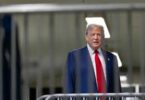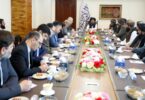William F. Wechsler, Kirsten Fontenrose, Barry Pavel, Barbara Slavin, Thomas S. Warrick, Borzou Daragahi, Abdulrahman al-Masri, C. Anthony Pfaff, Nader Uskowi, Mark N. Katz, Karim Mezran, Masoud Mostajabi
On February 25, the US military carried out airstrikes in eastern Syria that targeted Iran-backed Shia militias. The move is the first military action under the Joe Biden administration. The retaliatory strike comes after a rocket attack on February 15 near the Erbil Airport that killed a US military contractor and injured several, including a US service member. With nuclear negotiations on the horizon, what will this mean for the Biden administration’s ongoing effort to re-engage Iran?
William Wechsler: Experts must not link US action with prospects of successful nuclear negotiations
“These US strikes were taken in response to an intentionally calibrated series of escalations by Tehran designed to test the new Biden administration. Tehran’s goals are to push the US out of the region, to increase its leverage for the coming negotiations about the Joint Comprehensive Plan of Action (JCPOA), and to prevent any expansion of the scope of discussions beyond the nuclear file.”
“In the wake of these strikes we will undoubtedly hear voices critical of the US action who will predictably express concerns that such strikes will undermine the prospects of successful nuclear negotiations. But accepting such a linkage would only play into the Iranian strategy and would leave Americans vulnerable to more deadly attacks. The correct approach, as the Biden administration appears to recognize, is to deny such linkage altogether and instead act according to Yitzhak Rabin’s maxim, ‘We must fight terrorism as if there’s no peace process and work to achieve peace as if there’s no terror.’”
Kristen Fontenrose: New US administration, similar pattern
“The strikes ordered today against Iran-backed militia facilities in Syria continue the pattern of US response to Iranian attacks on US personnel and interests. The Donald Trump administration similarly responded to militia attacks in Iraq with airstrikes on arms depots and weapons caches for the same reasons the Biden administration is now doing the same: to minimize civilian casualties, mitigate further escalation, and lower the likelihood that innocent Iraqis will be incensed by the strikes and call for the eviction of the US presence. The Biden team is learning that extending an olive branch to the regime in Tehran does not impact Iran’s objective of pushing the US from the region, nor alter their methods for pursuing it. The past two years have shown that targeted airstrikes remove enemy capabilities from the battlefield in Iraq and Syria, but they do not curtail attacks on US forces or allies. The attacks on US forces in Iraq and US allies in the Gulf will continue regardless of nuclear negotiations, and the US will continue to be pressed to respond. The one possible differentiator could be the improved US-Europe relationship, if it leads to unified pressure on Iran to stop directing attacks or risk the continuation of sanctions.”
Barry Pavel: A careful calibration
“The US airstrikes were carefully calibrated in both targets as well as messaging. They were intended both to de-escalate the situation in the aftermath of Iranian-backed militia rocket attacks against a US base in Iraq that killed one American and wounded several others, while also making clear to the Iranians that the United States will respond to such aggression at a time and place of its choosing. It was reported that infrastructure targets were chosen so as not to target personnel per se.”
“This also has relevance to the ongoing diplomatic dance between the Biden administration and the Iranians regarding the parties’ prospective re-entry into the 2015 JCPOA. The US will not be pushed around.”
Barbara Slavin: Bad timing for nuclear deal talks
“The US decision to strike a target in Syria in response to attacks on Americans and US contractors in Iraq was a classic bank shot intended to send a clear message to Iran while not putting Iraq into an even more difficult situation. I hope it will have a deterrent effect on Tehran and its allied militias, but I worry about the timing as the Biden administration is also trying to entice Iran into talks on its nuclear program. There is a limited window for salvaging the JCPOA and anything that makes it harder for the Iranian government to enter talks with the US is concerning.”
Tom Warrick Iranian leaders wanted to bargain for more
“President Biden and his team could not have been clearer during the campaign that they were committed to getting the United States back into the (JCPOA). They were equally clear how they would do this: when Iran was back in compliance with the deal’s terms, the United States would come into compliance, too.”
“Iran’s response followed a very familiar if disappointing pattern. Rather than simply accept the Biden administration’s offer, Iranian leaders wanted to bargain for more. First, they signaled they expected unilateral US concessions. When this failed, Iranian leaders tried to signal disinterest in a rapid return to their own compliance. Then, on February 15, Iranian proxy forces attacked the American presence in Iraqi Kurdistan, killing one and wounding an American and several Iraqis.”
“Iran’s approach shows that Iranian leaders simply refuse to think the way some American foreign policy experts would like them to. Iranian leaders are not showing interest in a ‘freeze for freeze,’ ‘more for more,’ ‘less for less,’ or any other formulation that might make sense in Washington but not in Tehran. Instead, Iran’s Supreme Leader has made clear what Iran’s strategic goals are, including with the JCPOA. The Iranian regime wants what it thinks is the benefit of its bargain: the lifting of almost all economic sanctions against it, the ability to sell its oil for a maximum price, and no constraints on its proxy campaigns in Iraq, Syria, Lebanon, or Yemen, which are part of a strategy to drive the United States from the Gulf, starting with Iraq. Iran is extremely clear what its goals are. Washington has a different view of the JCPOA and of the strength of a combined United States-European negotiating position.”
“One of the frequently voiced complaints by critics of US policy towards Iran in Iraq is that Iran plays chess while the United States plays checkers. Cruel though this analogy may seem, given the loss of lives here, there is an essential element that must be understood in connection with President Biden’s decision to launch a single strike in Syrian territory against a single building housing forces of the Iranian proxy involved in the February 15 Irbil attack. The Iranian regime played the Trump administration to a draw, but the Biden team is prepared to be very different. This US airstrike shows we are seeing only the very first opening moves.”
Borzou Daragahi: Biden’s message to Iran
“We are not privy to the local dynamics that may have led up to the original February 15 rocket attack on a base in Erbil that prompted the latest US airstrikes. We know that it was widely perceived in Washington and the Middle East as a provocative move by Iranian-backed militias in Iraq. It was followed by February 22 rocket attacks on Baghdad’s Green Zone. Both attacks potentially amounted to an attempt by Iran to test the limits of the Biden administration. The White House said that it would not lash out aimlessly but vowed a calibrated response that would further rather than harm long-term US interests. If the two militia attacks were a message, the Biden administration’s answer was that it will not be deterred by Iran’s potentially provocative moves, nor will it be drawn into a trap that will damage its relations with the friendly government in Baghdad, weaken the position of Iraqi Prime Minister Mustafa al-Kadhimi in his fight with the militias, nor strengthen Tehran hardliners in their possible attempts to sabotage a return to diplomacy with Iran.”
Abdulrahman al-Marsi: Further escalation is unlikely
“As a response to the recent rocket attack on coalition forces in Iraq, the US airstrikes targeting Iranian-aligned militias in Syria is proportionate, and I doubt that it would lead to further escalation. Whether the strike establishes deterrence against future targeting of US and coalition posts is to be seen. Even if one argues that Iran was not responsible for the attack on coalition forces in Iraq on February 15 and that Iraqi militias are the ones who took the decision to launch the rocket, the airstrikes rightly inflict cost on these militias, whose activities span regional borders.”
“While there are some concerns that such a strike would complicate US efforts to re-negotiate the JCPOA with Tehran, there is an indication that the message the Biden administration is trying to convey here is one suggesting that Iran’s hostile regional policies will be addressed separately from talks over its nuclear program. This can be significant to understanding the new administration’s approach and, as such, the coming weeks should be revealing.”
C. Anothony Pfaff: US must de-escalate without showing weakness
“Imposing costs on Iran and its proxies should be a part of any approach to rolling back their malign influence in the region. No actor should be allowed to kill Americans without accountability. However, as with the January 2020 strikes that killed Quds Force Qassem Soleimani, what happens next matters. In the aftermath of those strikes, Tehran effectively mobilized Iraqi public opinion and parliament against the US military presence. By avoiding responding in Iraq, the Biden administration will likely limit such a reaction this time. Should any demonstrations occur, the US should use the opportunity to further isolate Iran’s proxies and portray any demonstrations for what they are: more examples of Iranian meddling.”
“The US also needs to be prepared to manage the escalation that will likely follow. Effective escalation management requires two things: escalation dominance and ‘off-ramps.’ Escalation dominance requires signaling the capability and willingness to impose significantly higher costs. Establishing off-ramps requires incentivizing Tehran to cease further escalation without rewarding it for initiating the current cycle of violence. Finding alternatives will be difficult. Things that might incentivize Iran, such as sanctions relief or renewing participation with the JCPOA without conditions, will reward the violence. Because of the limited space for de-escalation, the US needs to create points where it can deescalate without signaling weakness. Doing so requires an aggressive diplomatic campaign that holds out the possibility for negotiation while increasing international pressure on Tehran to cease its provocations. That way, even if Iran does escalate the US can still claim a win if it leaves the Iranian regime more isolated, and itself the stronger, more stable actor in the region.”
Nader Uskowi: The ball is in their court
“Iran-affiliated militia groups in Iraq had launched three attacks against US targets in one week. The Biden Administration could not tolerate Shia militia attacks targeting US personnel and facilities. The US airstrike on the Iranian-affiliated Shia militias at their base in Abu Kamal—on the border of Iraq and Syria—was a proportional response to their aggressive behavior. The ball is intheir court. Escalating the conflict by the Iranian-backed Iraqi militias could not possibly end well for them or for Iran.”
Mark N. Katz: Regional contest continues between the US and Iran
“What this latest incident shows is that even though the Biden Administration and President Hassan Rouhani have signaled their desire to revive the JCPOA, the regional contest continues between the US and its allies on the one hand and Iran and its allies on the other. As the Soviet-American experience in the 1970s showed, ongoing regional contestation can seriously undermine nuclear arms control efforts. This latest incident with Iran will make it harder for the Biden Administration to persuade Congress, the American public, and US allies in the Middle East that it can successfully revive nuclear arms control with Tehran while at the same time acting to thwart its regional ambitions. The challenge for Biden now will be to persuade these audiences, that even though the regional contest with Iran is going to continue, it is better to have limits on the Iranians.”
Michel Duclos: Deterrence and politics
These strikes make perfect sense in terms of deterrence as well as politics. Iran militia groups tested the new US administration by attacking American military facilities in Iraq. A proportionate response had been given, in a non-escalatory way. Now, it’s time to focus on the nuclear issue and fresh contacts between the US and Iran on a return to the JCPOA. On another level, it’s not bad to remind various actors that Abu Kamal is a key-knot on the “Shia corridor” towards the Mediterranean sea—a knot that should never have been conceded to IRGC. And a note of caution: we learned from experience that early strikes by a new administration do not guarantee a sound long term strategy.
Karim Mezran: A strong message, not a fatal blow
“On the one hand the strikes should be considered for what they are: limited. The US action has been more of a message than a serious military operation aimed at inflicting fatal blows to an enemy. On the other hand, just like Trump’s first strikes against militias in Syria—which happened in the early weeks of his presidency—Biden’s first operation carries consequences that might go much further. Is it intended to signal that ‘America is back’ and has no intention whatsoever to ignore—least of all leave—the region and its complicated political environment? Is it intended to send a signal to Iran that while there is a wide opening to negotiations there is little tolerance for acts of aggression and terrorism? Many questions remain unanswered.”
Masoud Mostajabi: Time to speed up the diplomatic front with Iran
“For the Biden administration, this may be an attempt to address the more hawkish politicians in Washington and signal that President Biden will remain tough on Iran, while attempting to re-enter the JCPOA. Moreover, the American people generally approve of strong measures such as this strike, which will certainly be reflected in Biden’s approval numbers.”
“However, the strike evokes the escalation cycle seen under the Trump administration, as there is always a risk that the message received may be beyond what may have been intended.”
“Nevertheless, this is the time to speed up the diplomatic front with Iran. Reducing tensions, diplomacy, and a return to the JCPOA must be fast-tracked sooner rather than later. The Biden administration cannot risk stumbling into a Middle East war neither country wants.”
Courtesy: AP News






